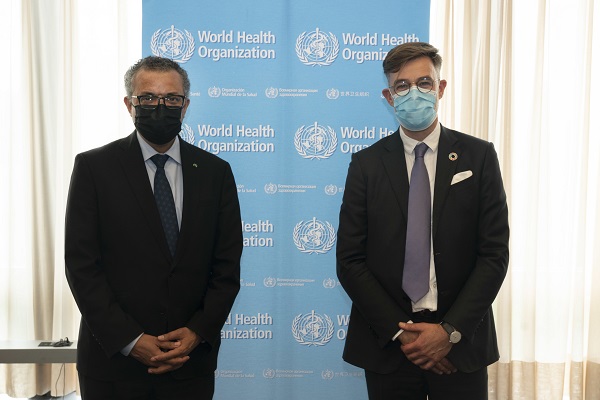 L-R: Dr. Tedros Adhanom Ghebreyesus, WHO Director-General; Franz Fayot, Luxembourg's Minister for Development Cooperation and Humanitarian Affairs;
Credit: WHO
L-R: Dr. Tedros Adhanom Ghebreyesus, WHO Director-General; Franz Fayot, Luxembourg's Minister for Development Cooperation and Humanitarian Affairs;
Credit: WHO
On Tuesday 8 June 2021, Luxembourg's Minister for Development Cooperation and Humanitarian Affairs, Franz Fayot, paid a working visit to Geneva, the headquarters of the humanitarian activities of the United Nations (UN) system.
During his trip, Minister Franz Fayot met Dr. Tedros Adhanom Ghebreyesus, Director-General of the World Health Organization (WHO). In 2020, Luxembourg and the WHO signed a new strategic partnership framework, aligned with the WHO General Programme of Work, thus strengthening the Grand Duchy's long-standing support, to the tune of more than of €7 million per year for a period of four years.
The meeting was also an opportunity to take stock of the current health situation, including the strengthening of the response to COVID-19 on a global scale. In this context, Minister Franz Fayot announced specific support of up to €200,000 euros for the WHO Contingency Fund for Emergencies. This programme allows WHO to respond quickly to health emergencies, for example during recent outbreaks of the Ebola virus in the Democratic Republic of Congo.
Luxembourg's Development Minister also met Peter Maurer, President of the International Committee of the Red Cross (ICRC), a long-standing key player and trusted partner of Luxembourg's development cooperation programme, and signed a new strategic partnership framework, with an increased contribution of €9 million per year for a period of four years. Luxembourg will take on the co-presidency of the ICRC's donor support group from June 2021. Discussions also focused on the role of digital technologies as a catalyst for humanitarian action, while respecting the principle of do no harm in a more digital environment, as well as the increasingly complex contexts of many humanitarian crises.
In addition, Minister Franz Fayot signed strategic partnership frameworks with the UN Office for the Coordination of Humanitarian Affairs (UNOCHA), and the UN Office for Disaster Risk Reduction (UNDRR). He also had the opportunity to discuss the role of innovation in contexts of forced displacement with representatives of the UN High Commissioner for Refugees (UNHCR).








